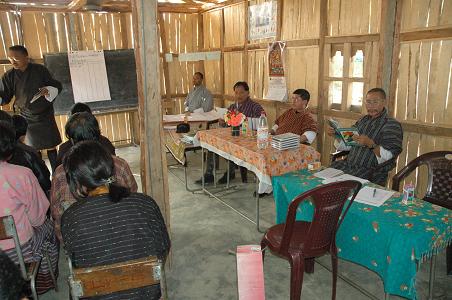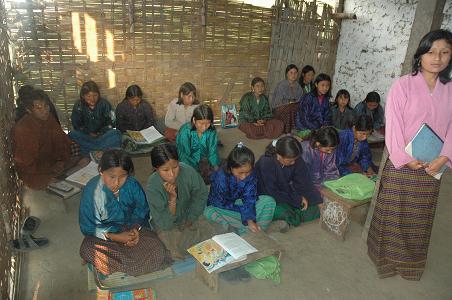The office of the Non – Formal and Continuing Education Division (NFCED) under the Department of Adult and Higher Education (DAHE) has brought in phenomenal success by proving functional literacy program to those sections of population aged 15 to 50 who have missed formal schooling due to varied reasons. The program after having been taken over by the Ministry of Education in 1993 from the Dzongkha Development Commission had benefitted almost 190, 000 adult illiterate learners and 11, 000 continuing education learners.
Over a decade there has been significant growth and diversification of the program with the introduction of Post Literacy Course (PLC), Community Learning Centre (CLC), Continuing Education (CE) and functional English course. However, with the society becoming more knowledge-based, there is an urgent need to strengthen the programmes to effectively cater and address the learning needs and skills development of those who have missed the formal education system.
Aims and Objectives
- Provide functional literacy and numeracy skills to youth and adults who have missed the formal education.
- Provide opportunity to aspiring learners to continue their education and be integrated into the mainstream education.
- Provide avenues for basic vocational, cultural and traditional education programme for enhancing self-learning and skills to improve their livelihood.
The NFCED focuses on the following activities:-
1. Non – Formal Education Program
Non-Formal Education Program is an educational activity which is targeted at providing functional literacy and numeracy skills to youth and adults who have missed the formal education system. It is designed to meet the learning needs of educationally disadvantaged persons, aged 15 years and above through basic literacy and life skills programmes, and to enhance their capacity to be productive. The NFE programme is flexible in terms of organization, time, and place.
2. Continuing Education
Continuing Education is a lifelong learning and career enhancement programme offered to youth and adults, who could not complete their school education, to continue their further education. This programme is provided through evening classes.
3. Community Learning Centre
Community Learning Centre is a local educational centre, which is usually set up and managed by the local people to provide avenues for basic vocational, cultural and traditional education programme to NFE learners who completed their post literacy course and neo-literates, besides providing avenues for enhancing self-learning.
The office of the Non – Formal and Continuing Education Division (NFCED) under the Department of Adult and Higher Education (DAHE) has brought in phenomenal success by proving functional literacy program to those sections of population aged 15 to 50 who have missed formal schooling due to varied reasons. The program after having been taken over by the Ministry of Education in 1993 from the Dzongkha Development Commission had benefitted almost 190, 000 adult illiterate learners and 11, 000 continuing education learners.
Over a decade there has been significant growth and diversification of the program with the introduction of Post Literacy Course (PLC), Community Learning Centre (CLC), Continuing Education (CE) and functional English course. However, with the society becoming more knowledge-based, there is an urgent need to strengthen the programmes to effectively cater and address the learning needs and skills development of those who have missed the formal education system.
Aims and Objectives
- Provide functional literacy and numeracy skills to youth and adults who have missed the formal education.
- Provide opportunity to aspiring learners to continue their education and be integrated into the mainstream education.
- Provide avenues for basic vocational, cultural and traditional education programme for enhancing self-learning and skills to improve their livelihood.


